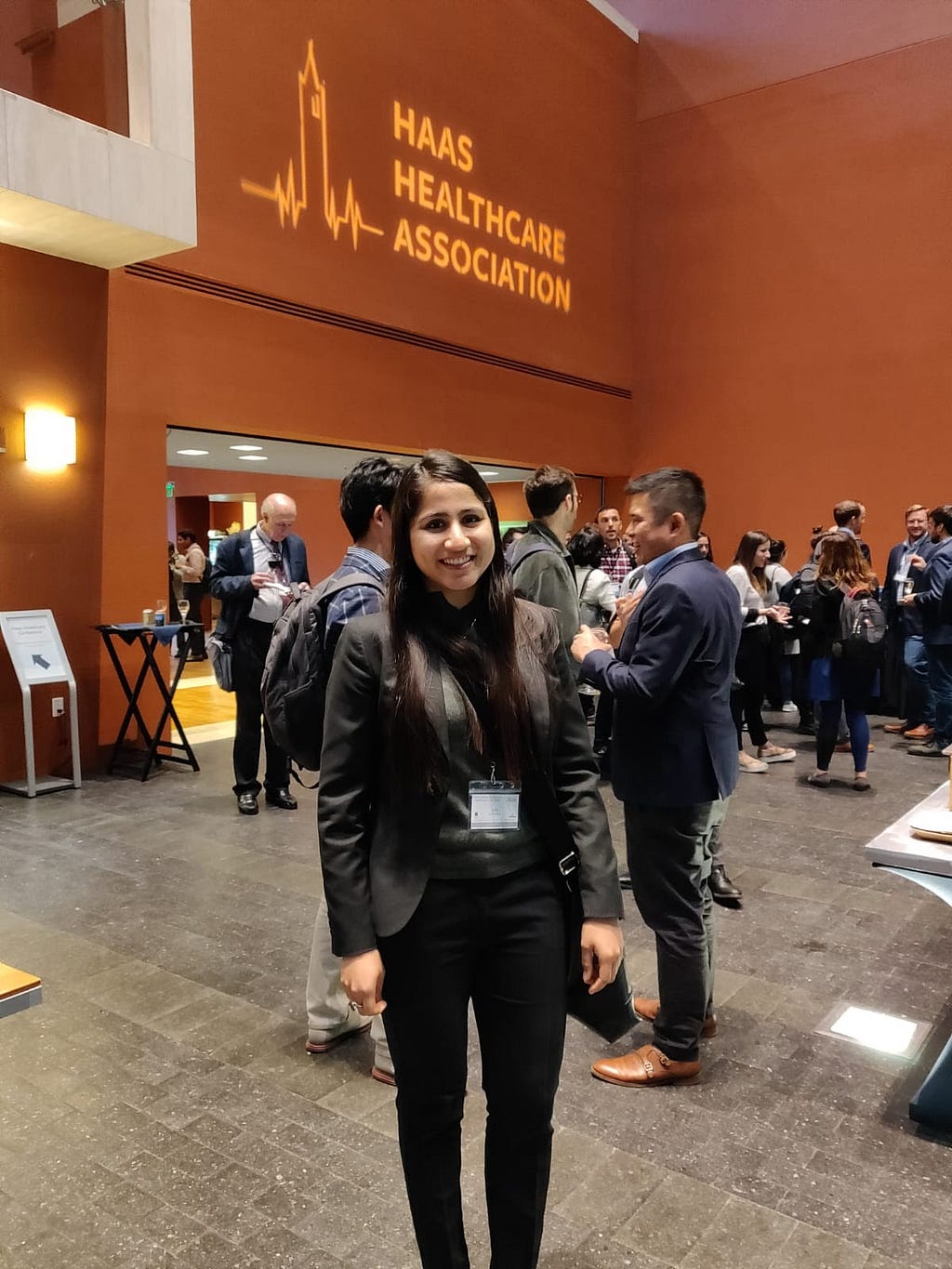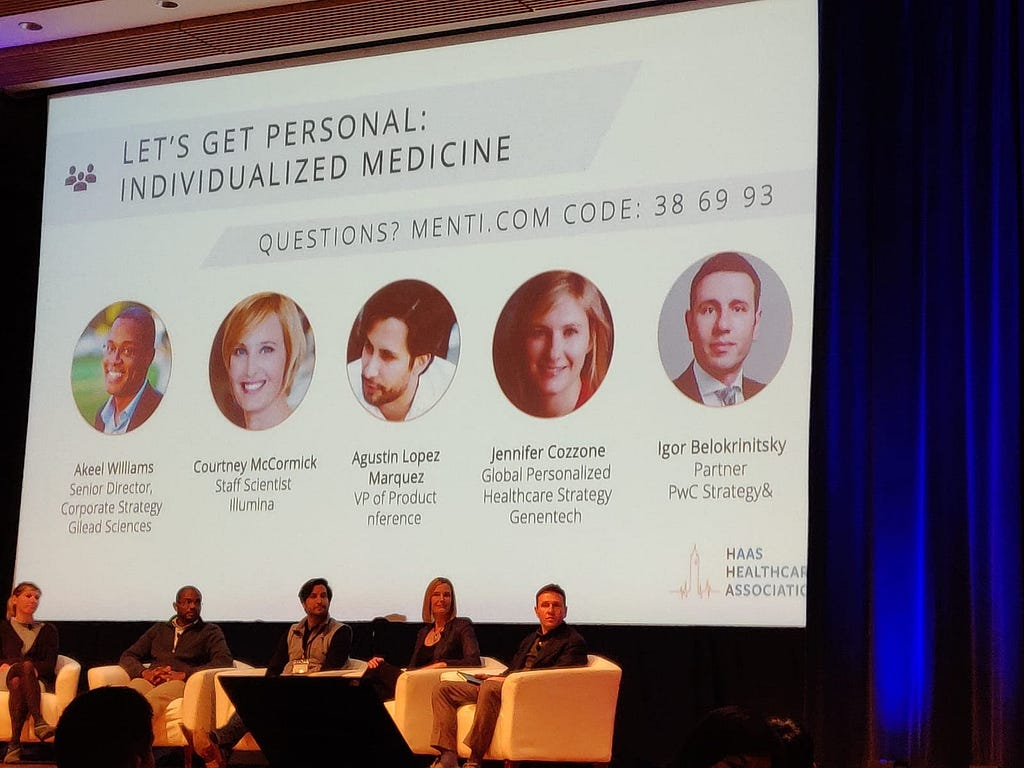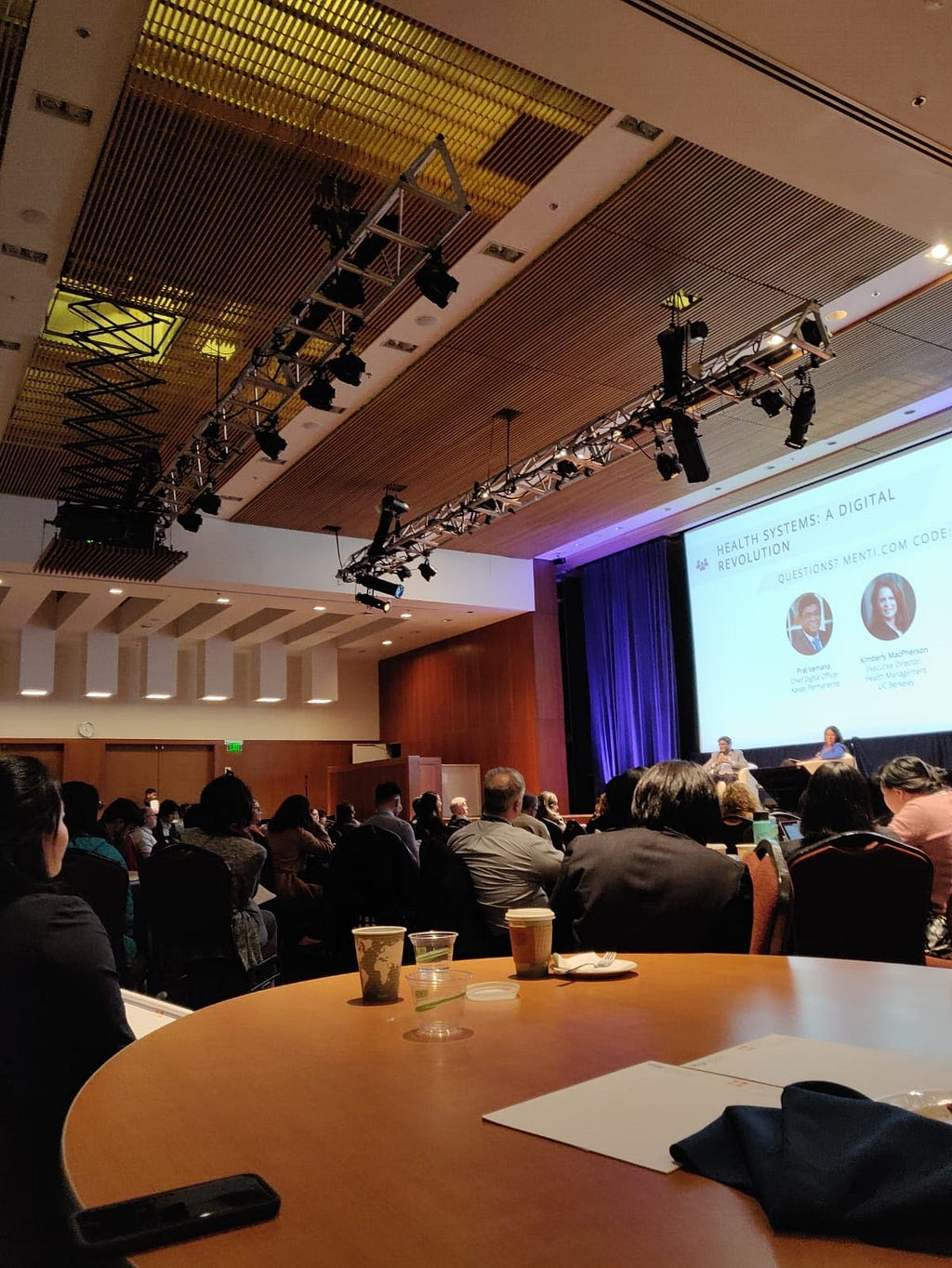By Isha Sharma, MEng ’20 (BIOE)
Isha Sharma, MEng ’20 (BIOE), had the recent opportunity to attend the 13th annual Haas Healthcare Conference on March 6, 2020. The mission of the Haas Healthcare Conference is to “bring together leaders and innovators from across the healthcare sector to discuss emerging trends and new solutions to the industry’s most pressing challenges.” Here, she discusses her experience and takeaways from the event, as well as her perspective on healthcare innovation.
How do you think healthcare is changing?
“Healthcare is changing as it moves from volume-based care to value-based care. There is an increasing focus on improving the patient outcome, which is a marked change from the older fee-for-service model, wherein the healthcare providers were compensated for the number of procedures done, regardless of improvement in patient health. In addition, there is a growing focus on social determinants of health (SDOH), which is defined by the individual’s surroundings, and how SDOH can influence one’s health and treatment outcomes. Where one lives, works, and studies can strongly impact their healthcare outcomes, with evidence indicating individuals from low income, unstable housing, or unsafe neighborhoods are more likely to indulge in unhealthy activities and is a precursor for health inequity.“Where one lives, works, and studies can strongly impact their healthcare outcomes.”
What sessions did you attend at the conference?
The goal of the conference was to initiate a dialogue to rethink the existing healthcare policies and to develop new and improved solutions that focus on healthcare equity, as well as to reconceive how care is delivered. To that end, I was able to attend three sessions throughout the duration of the conference that analyzed and discussed issues and topics related to this goal. I started with the first session on ‘Dismantling America’s addiction problem,’ which gave an overview of the opioid crisis, the challenges with the existing de-addiction system, and how we can address the issue. I particularly liked that the panelists for this session included Daniela Tudo from WEconnect Health management, a digital platform provider for tackling substance use disorder. Daniela spoke about her personal story — her journey from battling addiction to helping others overcome the same—which offered much more depth to the discussion. I followed this with the next session on ‘Advancing Equity in Digital Health,’ which talked of the disparity in designing digital health platforms, which are mostly driven by data gathered from the wealthy or those who can afford such service. The session further called out the need to bring in people from all walks of life and to include their inputs while designing any healthcare technology. The last session I attended was ‘Let’s get personal: Individualized medicine,’ a discussion on personalized medicine, with panelists from some of the behemoths in the life science industry — Genentech, Gilead, and Illumina. There were also other events throughout the day, including a startup pitch competition and a networking event with Kaiser Permanente’s Digital Transformation Group. The day concluded with a talk on the digital revolution in the healthcare system, with Professor Kimberley Macpherson from the Haas School of Business and Prat Vemana from Kaiser Permanente discussing how technology is changing the shape of healthcare, and how it is increasingly becoming integrated and essential for healthcare services.

In addition to learning about the changing healthcare industry, this conference appeared to be an opportunity to network. How was your networking experience at the conference?
Through this conference, I not only got the opportunity to listen to really insightful and engaging discussions on healthcare, but also to engage with several different individuals operating in the healthcare space — from a Healthcare Insurance Provider to a Regulatory Affairs specialist to a Chief Digital Officer at one of the largest healthcare consortiums in the US. One of the greatest things I learned after attending a conference of such a huge scale and with individuals across the broad spectrum of the healthcare industry, is that the Berkeley brand is a great asset. You are easily distinguished amongst your peers for your academic parentage, given that Berkeley is greatly respected in the industry. As an MEng student, we can carve a unique niche for ourselves, and this became evident while I was speaking to a VP of a healthcare data consulting firm. MEng students can not only converse on technical matters (such as data analytics), but also on a broad range of areas taught in the leadership curriculum — be it ethics in technology to technology strategy. We are better prepared to understand the technological and business aspects of any industry, as a result of our integrated technical and leadership curriculum, which immediately distinguishes us from individuals with pure business or research backgrounds.“MEng students are better prepared to understand the technological and business aspects of any industry, as a result of our integrated technical and leadership curriculum.”Furthermore, the MEng career development team has been very helpful, particularly for those who are new to the concept of networking. They have definitely helped me pitch myself better, be a lot more expressive, and build some meaningful connections. All in all, my experience of participating in such conferences and their associated networking events has been greatly enhanced by the guidance from the career development team.
What was your biggest takeaway from the conference?
The biggest takeaway from the conference for me is that the healthcare space is evolving at a rapid pace, on several fronts, with the advances in artificial intelligence, personalized medicine, and the CRISPR technology. These advancements call for an adaptation within the healthcare system to maximize their potential. In addition, there is a critical need to revamp the US healthcare system on several fronts — drug pricing and prescription, our definition of the optimal health outcomes, identifying the social determinants of health, and moving from a treatment-based model to a prevention-based healthcare model.”“The healthcare space is evolving at a rapid pace, on several fronts...These advancements call for an adaptation within the healthcare system to maximize their potential.”
About the Author:
Isha Sharma is an MEng Bioengineering student who is passionate about improving the healthcare system by focusing on affordability, accessibility, and non-invasiveness. She completed her undergraduate degree at Delhi Technological University with her major thesis on computational biology, which allowed her to publish several research papers in notable journals. After that, she worked in management consulting with Bain & Co, and her passion for the healthcare systems brought her to the United States. She currently represents the MEng cohort as an academic representative, and is a delegate for the Department of Bioengineering at the Graduate Assembly. In her free time, she enjoys dancing or watching documentaries on anything ‘Healthcare.’ Connect with Isha.Exploring the forefront of innovation at the Haas Healthcare Conference was originally published in Berkeley Master of Engineering on Medium, where people are continuing the conversation by highlighting and responding to this story.

